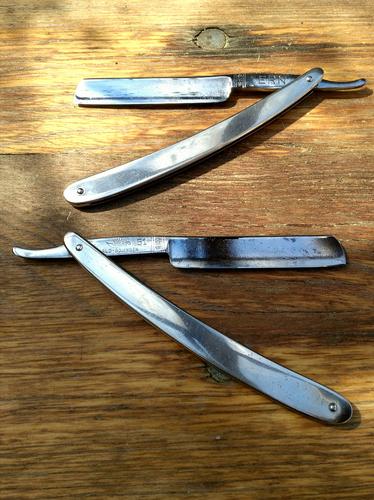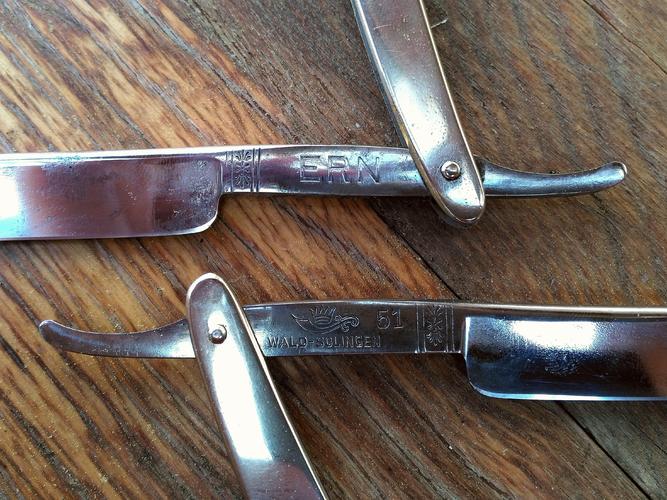Results 11 to 20 of 42
-
04-27-2020, 05:16 PM #11Senior Member

- Join Date
- Sep 2009
- Location
- Plymouth, UK
- Posts
- 313
Thanked: 19 Crown & Sword in stainless scales
Crown & Sword in stainless scales
Resurrecting an old thread...
I thought I'd add these to the record, a pair of 9/16" quarter hollow/ near wedge Crown & Sword in stainless scales:


And a question, is my understanding correct that steel-scaled razors were primarily for use in medical contexts, as they could be sterilised in an autoclave?
Many thanks!
-
04-27-2020, 05:54 PM #12

I have a few Joseph Rodgers HMG..I assumed they were from a prison ... Next venture into the volts i will take pictures
-
04-27-2020, 09:52 PM #13

Back in the day metal was commonly used. Sterling Silver and Cast Aluminum. Stainless came later but it's out there and not that hard to find.
No matter how many men you kill you can't kill your successor-Emperor Nero
-
04-28-2020, 03:22 PM #14

4/8 Klas Tornböm 77 in aluminum scales.
My doorstop is a Nakayama
-
04-28-2020, 07:05 PM #15

The German metal scaled military razor and surgical razors were marked with a long arrow/ sword and were named "Shwert." Usally scales were stainless steel. There were others later in the war made by others and not marked.
Most later ones would have come from occupied countries. JMHO
-RichardLast edited by Geezer; 04-28-2020 at 07:07 PM.
Be yourself; everyone else is already taken.
- Oscar Wilde
-
The Following User Says Thank You to Geezer For This Useful Post:
Montgomery (04-29-2020)
-
04-29-2020, 12:31 PM #16Senior Member

- Join Date
- Sep 2009
- Location
- Plymouth, UK
- Posts
- 313
Thanked: 19
I am curious what the relationship between stainless steel scales and surgical use was: Were most razors in stainless steel scales for surgical use? There is something that feels different about my Crown & Sword razors above, the scales are heavy and a bit unwieldy for shaving oneself with, and they seem to be made to a very high level of precision, higher than the standard razor. Overall, the feel is quite different.
-
04-29-2020, 12:46 PM #17

I cannot say for sure . . . body fluids are saline and corrosive to most metals. Corrosion of medical equipment would allow breeding areas for such nasties as tetanus. Even now tetanus alone causes system wide disease.
It's mostly contracted by cuts from rusty metal.
Other scales of aluminum were hi buck bling before WWI when smelting processes were improved by the war efforts.
Precious metals were often used for razors of folks having their own servants.
JMHO
-RichardBe yourself; everyone else is already taken.
- Oscar Wilde
-
04-29-2020, 01:52 PM #18Senior Member

- Join Date
- Sep 2009
- Location
- Plymouth, UK
- Posts
- 313
Thanked: 19
Many thanks!
I think the point about the stainless steel scales is that they would allow a razor to go in the autoclave and be sterilised with all the other surgical instruments, which other scale materials would not allow. Given that razors would certainly be used in a surgical context, it makes sense that the best scale material would have been stainless steel, as with other surgical instruments. I'm going to assume this to be the case until some information to the contrary comes up.
The corollary to this question is the one I'm currently still concerned with, which is to what extent stainless steel scales were used outside the medical context.
-
04-29-2020, 04:38 PM #19

At the time that most of these razors were made/used, autoclaves were probably not in widespread use, particularly in military field Hospitals and rural villages. My guess is that the intent was that you could give them a trip through boiling water before the next patient/victim.
My doorstop is a Nakayama
-
The Following User Says Thank You to Steve56 For This Useful Post:
Geezer (04-29-2020)
-
04-29-2020, 04:48 PM #20Senior Member

- Join Date
- Sep 2009
- Location
- Plymouth, UK
- Posts
- 313
Thanked: 19


 71Likes
71Likes LinkBack URL
LinkBack URL About LinkBacks
About LinkBacks






 Reply With Quote
Reply With Quote




